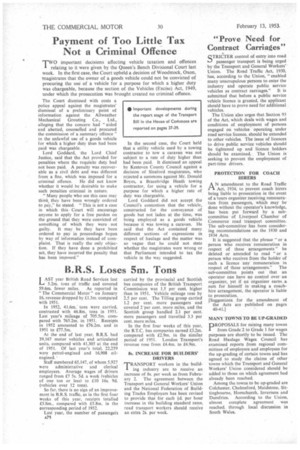Payment of Too Little Tax Not a Criminal Offence
Page 30

If you've noticed an error in this article please click here to report it so we can fix it.
TWO important decisions affecting vehicle taxation and offences relating to it were given by the Queen's Bench Divisional Court last week. In the first case, the Court upheld a decision of Woodstock, Oxon, magistrates that the owner of a goods vehicle could not be convicted of procuring the use of a vehicle for a purpose for which a higher duty was chargeable, because the section of the Vehicles (Excise) Act, 1949, under which the prosecution was brought created no criminal offence.
The Court dismissed with, costs a police appeal against the magistrates' dismissal of a preliminary point of information against the Allweather Mechanical Grouting Co., Ltd., alleging that the concern had "aided and abetted, counselled and procured the commission of a summary offence" in the unlawful use of a goods vehicle for which a higher duty than had been paid was chargeable.
Lord Goddard, the Lord Chief Justice, said that the Act provided for penalties where the requisite duty had not been paid. A penalty was recoverable as a civil debt and was different from a fine, which was imposed for a criminal offence. He did not know whether it would be desirable to make such penalties criminal in nature.
"Many people who see this case may think they have been wrongly ordered to pay," he stated. "This is not a case in which this. Court will encourage anyone to apply for a free pardon on the ground that they were convicted of something of which they were not
guilty. It may be they have been ordered to pay in proceedings begun by way of information instead of complaint. That is really the only objection. If they have done a prohibited act, they have incurred the penalty that has been imposed." In the second case, the Court held that a utility vehicle used by a towing contractor to tow a caravan was not subject to a rate of duty higher than had been paid. It dismissed an appeal by Kesteven County Council against a decision of Sleaford magistrates, who rejected a summons against Mr. Donald Boyes, a Bracebridge Heath towing contractor, for using a vehicle for a purpose for which a higher rate of duty was chargeable.
Lord Goddard did not accept the Council's contention that the vehicle, constructed for the conveyance of goods but not laden at the time, was being employed as a goods vehicle because it was towing a caravan. He said that the Act contained many different sections of expressions in respect of haulage and the matter was so vague that he could not state whether the magistrates were wrong or that Parliament intended to tax the vehicle in the way suggested.




















































































